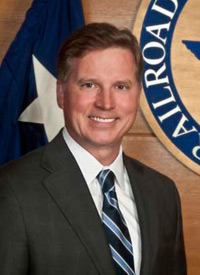If You Work for Texas’ Oil and Gas Regulator, You’re Not Allowed to Comment for This Story

Photo courtesy of Railroad Commission of Texas
Barry Smitherman is the chair of the Railroad Commission of Texas
Sometimes old news is anything but. That seemed to be the case this week when the Associated Press reported that the Railroad Commission, the oil and gas regulator in Texas, had banned interviews with the media. “Texas’ oil and gas regulatory agency has instituted a blanket policy barring staff members from doing media interviews, raising questions about transparency as the state grapples with the intricacies of one of the largest energy booms in decades,” the story said.
The policy isn’t new. It was approved by the three commissioners who head the agency in August 2012 (not a year later, as the AP reported), and it was discussed in two open meetings. It hasn’t been modified since. It’s not even an “unusual” policy for Texas, as it was closely modeled after a rule in effect at the state Attorney General’s office. All the Railroad Commissioners did was change the names.
“This is already policy,” then-commissioner Buddy Garcia said during the first meeting discussing the idea in July 2012. The commission was trying to put in “layman’s terms” how staff should handle media requests, Garcia said.
The media policy, which you can read in full below, says that with the exception of the commissioners and their staff, everyone else that works at the agency must go through the Railroad Commission’s Media Affairs Director or the Executive Director. The AP says this week that Milton Rister, who has been Executive Director since October 2012 (after the policy was passed), has not approved any interviews with Railroad Commission staff. Ramona Nye, a spokesperson for the commission, confirms that no interviews with staff have been approved.
Even if a staff member is given permission to do an interview, the “employee shall be responsible for any misinformation, misquotes, misinterpretations or misrepresentations conveyed by the employee,” the policy says. “Failure to comply with this policy could result in disciplinary action, up to and including dismissal.”
For what it’s worth, in our experience, it’s been next to impossible to talk to Railroad Commission staff about their work. That appears to be the aim of the policy. Interviews with commissioners, however, who are elected to the office, can be much easier to come by, if requested through their chiefs of staff.
As we’ve noted in much of our reporting on the agency, openness and transparency is not their strong suit. But it’s been that way for some time.
Read the full media policy of the Railroad Commission, the state’s oil and gas regulator:
